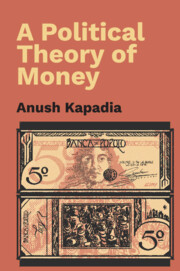Preface
Published online by Cambridge University Press: 14 September 2023
Summary
This book is both a collection and a synthesis. While some of the case-study chapters started as responses to the global financial crisis of 2007–2008, the bulk of the theoretical section was written to synthesise the lessons learned from the cases and to connect them with all three major schools of monetary thought. The test of this synthesis, like all theories, is its generality: how many monetary contexts can it speak to?
The work synthesises elements from all three schools of monetary thought. Social theory is best seen as a resource from which we can select various elements from various theories to assemble our own social–theoretic machines fit to tackle our particular questions. Loyal adherence to a particular school therefore can end up damaging the work of social theory. As complex compounds assembled in particular contexts for particular questions, social theories are quite modular. Each element can in principle be recombined with elements from other theories. Theories are not infinitely recombinable, of course, and we will constantly argue over which elements are foundational, which are dispensable, which necessarily hang together and which are separable. But such arguments already concede the inherent modularity of theory.
The theoretical synthesis we attempt here combines elements from the Banking, State and Currency Schools with lessons from classical political economy and old institutional economics. The Banking School understands money as credit, as means of payment for settling debts public and private. It carries an implicit institutionalism because it recognises the futural orientation of all economic life: only institutions can help us collectively manage the uncertain future; institutionalism and futurity go hand in hand.
But the Banking School lacks an adequate account of hierarchy in money—why some monies are better than others—taking refuge in the nominal power of the law. This is the domain of the State School, which identifies the state as being central to money but does so by raising the state's nominal power to such a height that it ironically eclipses politics itself. This book seeks to improve upon the State School's understanding of money by placing it with a political understanding of the ontology of all social institutions including the state, an understanding inspired by Roberto Unger though it has many referents.
Finally, the book urgently insists on the materiality of money.
- Type
- Chapter
- Information
- A Political Theory of Money , pp. xi - xiiPublisher: Cambridge University PressPrint publication year: 2024



